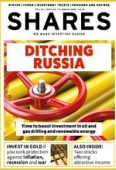Archived article
Please note that tax, investment, pension and ISA rules can change and the information and any views contained in this article may now be inaccurate.
Amazon’s share price is about to become a lot cheaper

A high price can stop investors from buying a particular stock, simply because they cannot afford it. Not everyone has the $1,000+ which it costs to buy a single share in many US-listed companies. It’s a long-standing frustration but slowly we are seeing solutions to the problem.
Amazon has joined the likes of Alphabet, Apple and Tesla in doing a ‘stock split’. Each existing Amazon share will be replaced by 20 new ones in June. By increasing the number of shares in issue Amazon’s price will automatically drop and become a lot more affordable for people who only have a limited amount of money to invest.
Existing Amazon investors needn’t worry about the stock split bringing down the price by a large amount as from a technical perspective the exercise is unrelated to the value of the company.
However, in Amazon’s case the news of the impending split has served to push up the price of the stock as investors are speculating it might be in more demand post-split.
Let’s say someone owned 10 shares in Amazon. At the time of writing the shares traded at $2,936 and the business was valued at $1.49 trillion. If the stock split were to happen now, the shareholder would have their 10-stock holding replaced by 200 new shares. The business would still be worth the same at $1.49 trillion, but the share price would be reduced by a factor of 20 to $146.80.
Put another way, someone who had $2,936 invested in one Amazon ‘old’ share would still have the same $2,936 investment – but they would now own 20 shares at the lower price (20 x $146.80 = $2,936). It’s like cutting a cake into more pieces and giving the existing investor more slices.
Stock splits have a psychological benefit as the reduced price might seem like a bargain to certain investors who haven’t taken the time to understand what’s gone on. You may also have a group of investors who can now afford the shares for the first time. These two factors can sometimes result in positive share price gains.
Bank of America looked at the performance of companies announcing stock splits since 1980 and found they outperformed the S&P 500 by 16.3% over the 12 months after the split announcement. However, it also said that stock splits saw negative returns about 30% of the time over the first 12 months, with an average 22% decline.
In the future it is possible that companies won’t bother with stock splits if the ability to buy and sell fractional shares becomes more commonplace. These are a portion of a share.
For now, high prices aren’t really a problem on the UK stock market, with only four names in the FTSE All-Share index trading above £100, being Lindsell Train Investment Trust (LTI), Personal Assets Trust (PNL), Spirax-Sarco Engineering (SPX) and Ferguson (FERG).
Important information:
These articles are provided by Shares magazine which is published by AJ Bell Media, a part of AJ Bell. Shares is not written by AJ Bell.
Shares is provided for your general information and use and is not a personal recommendation to invest. It is not intended to be relied upon by you in making or not making any investment decisions. The investments referred to in these articles will not be suitable for all investors. If in doubt please seek appropriate independent financial advice.
Investors acting on the information in these articles do so at their own risk and AJ Bell Media and its staff do not accept liability for losses suffered by investors as a result of their investment decisions.
Issue contents
Editor's View
Feature
Great Ideas
- Tharisa shares hit new record high as metal prices rally
- Why Hill & Smith’s share price has fallen too far
- Fancy 9% dividend yield? M&G is the answer
- Hargreaves Services delights investors by raising its full year outlook again
- Buy this Canadian fund for income and exposure to attractive sectors
- Don’t panic about drop in Heptagon European fund
News
- Quality growth strategy delivered strong returns in 2021 for Smithson
- Sanctions create potential earnings boost for non-Russian potash producers
- Mike Ashley increases Frasers’ stake in German fashion retailer Hugo Boss
- Why global shares could receive a major boost from large pension fund rebalancing
- Investors in China should brace for even greater volatility as risks multiply

 magazine
magazine








